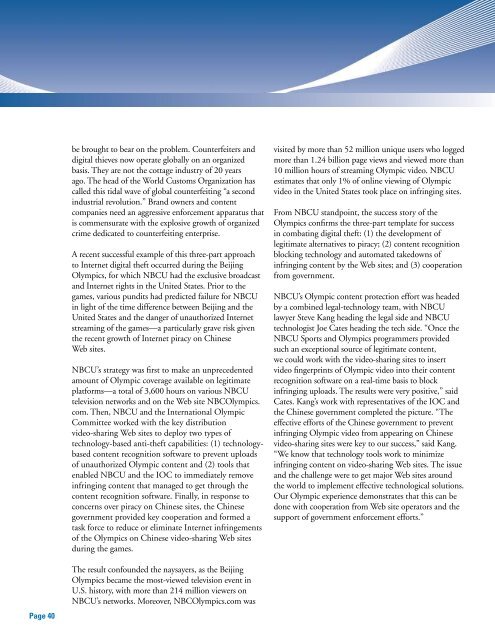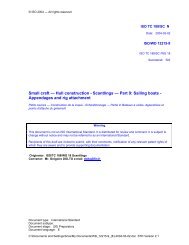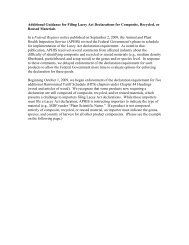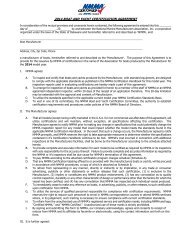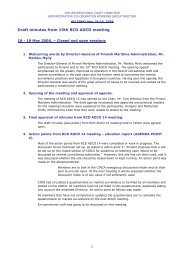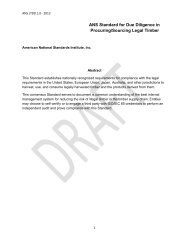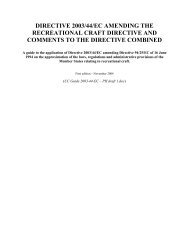Intellectual Property Protection and Enforcement Manual - Ipr-policy.eu
Intellectual Property Protection and Enforcement Manual - Ipr-policy.eu
Intellectual Property Protection and Enforcement Manual - Ipr-policy.eu
Create successful ePaper yourself
Turn your PDF publications into a flip-book with our unique Google optimized e-Paper software.
e brought to bear on the problem. Counterfeiters <strong>and</strong><br />
digital thieves now operate globally on an organized<br />
basis. They are not the cottage industry of 20 years<br />
ago. The head of the World Customs Organization has<br />
called this tidal wave of global counterfeiting “a second<br />
industrial revolution.” Br<strong>and</strong> owners <strong>and</strong> content<br />
companies need an aggressive enforcement apparatus that<br />
is commensurate with the explosive growth of organized<br />
crime dedicated to counterfeiting enterprise.<br />
A recent successful example of this three-part approach<br />
to Internet digital theft occurred during the Beijing<br />
Olympics, for which NBCU had the exclusive broadcast<br />
<strong>and</strong> Internet rights in the United States. Prior to the<br />
games, various pundits had predicted failure for NBCU<br />
in light of the time difference between Beijing <strong>and</strong> the<br />
United States <strong>and</strong> the danger of unauthorized Internet<br />
streaming of the games—a particularly grave risk given<br />
the recent growth of Internet piracy on Chinese<br />
Web sites.<br />
NBCU’s strategy was first to make an unprecedented<br />
amount of Olympic coverage available on legitimate<br />
platforms—a total of 3,600 hours on various NBCU<br />
television networks <strong>and</strong> on the Web site NBCOlympics.<br />
com. Then, NBCU <strong>and</strong> the International Olympic<br />
Committee worked with the key distribution<br />
video-sharing Web sites to deploy two types of<br />
technology-based anti-theft capabilities: (1) technologybased<br />
content recognition software to prevent uploads<br />
of unauthorized Olympic content <strong>and</strong> (2) tools that<br />
enabled NBCU <strong>and</strong> the IOC to immediately remove<br />
infringing content that managed to get through the<br />
content recognition software. Finally, in response to<br />
concerns over piracy on Chinese sites, the Chinese<br />
government provided key cooperation <strong>and</strong> formed a<br />
task force to reduce or eliminate Internet infringements<br />
of the Olympics on Chinese video-sharing Web sites<br />
during the games.<br />
visited by more than 52 million unique users who logged<br />
more than 1.24 billion page views <strong>and</strong> viewed more than<br />
10 million hours of streaming Olympic video. NBCU<br />
estimates that only 1% of online viewing of Olympic<br />
video in the United States took place on infringing sites.<br />
From NBCU st<strong>and</strong>point, the success story of the<br />
Olympics confirms the three-part template for success<br />
in combating digital theft: (1) the development of<br />
legitimate alternatives to piracy; (2) content recognition<br />
blocking technology <strong>and</strong> automated takedowns of<br />
infringing content by the Web sites; <strong>and</strong> (3) cooperation<br />
from government.<br />
NBCU’s Olympic content protection effort was headed<br />
by a combined legal-technology team, with NBCU<br />
lawyer Steve Kang heading the legal side <strong>and</strong> NBCU<br />
technologist Joe Cates heading the tech side. “Once the<br />
NBCU Sports <strong>and</strong> Olympics programmers provided<br />
such an exceptional source of legitimate content,<br />
we could work with the video-sharing sites to insert<br />
video fingerprints of Olympic video into their content<br />
recognition software on a real-time basis to block<br />
infringing uploads. The results were very positive,” said<br />
Cates. Kang’s work with representatives of the IOC <strong>and</strong><br />
the Chinese government completed the picture. “The<br />
effective efforts of the Chinese government to prevent<br />
infringing Olympic video from appearing on Chinese<br />
video-sharing sites were key to our success,” said Kang.<br />
“We know that technology tools work to minimize<br />
infringing content on video-sharing Web sites. The issue<br />
<strong>and</strong> the challenge were to get major Web sites around<br />
the world to implement effective technological solutions.<br />
Our Olympic experience demonstrates that this can be<br />
done with cooperation from Web site operators <strong>and</strong> the<br />
support of government enforcement efforts.”<br />
Page 40<br />
The result confounded the naysayers, as the Beijing<br />
Olympics became the most-viewed television event in<br />
U.S. history, with more than 214 million viewers on<br />
NBCU’s networks. Moreover, NBCOlympics.com was


